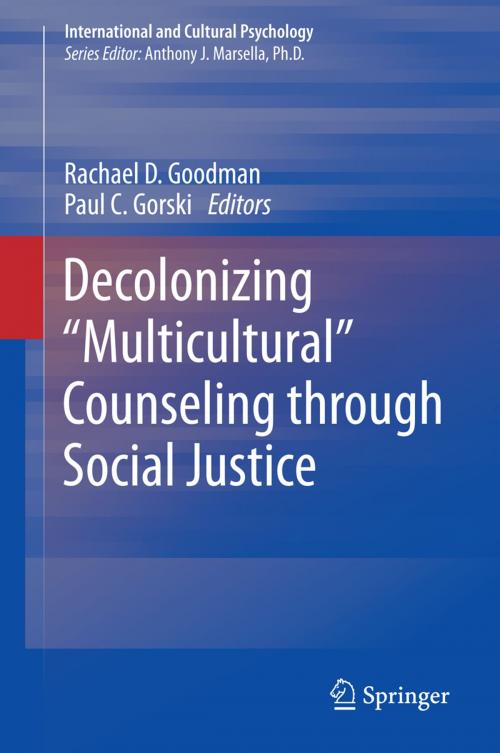Decolonizing “Multicultural” Counseling through Social Justice
Nonfiction, Health & Well Being, Psychology, Psychotherapy, Social Psychology| Author: | ISBN: | 9781493912834 | |
| Publisher: | Springer New York | Publication: | November 3, 2014 |
| Imprint: | Springer | Language: | English |
| Author: | |
| ISBN: | 9781493912834 |
| Publisher: | Springer New York |
| Publication: | November 3, 2014 |
| Imprint: | Springer |
| Language: | English |
Multicultural counseling and psychology evolved as a response to the Eurocentrism prevalent in the Western healing professions and has been used to challenge the Eurocentric, patriarchal, and heteronormative constructs commonly embedded in counseling and psychology. Ironically, some of the practices and paradigms commonly associated with “multiculturalism” reinforce the very hegemonic practices and paradigms that multicultural counseling and psychology approaches were created to correct.
In Decolonizing "Multicultural" Counseling through Social Justice, counseling and psychology scholars and practitioners examine this paradox through a social justice lens by questioning and challenging the infrastructure of dominance in society, as well as by challenging ourselves as practitioners, scholars, and activists to rethink our commitments. The authors analyze the ways well-meaning clinicians might marginalize clients and contribute to structural inequities despite multicultural or cross-cultural training, and offer new frameworks and skills to replace the essentializing and stereotyping practices that are widespread in the field. By addressing the power imbalances embedded in key areas of multicultural theory and practice, contributors present innovative methods for revising research paradigms, professional education, and hands-on practice to reflect a commitment to equity and social justice. Together, the chapters in this book model transformative practice in the clinic, the schools, the community, and the discipline. Among the topics covered:
- Queering multicultural competence in counseling.
- Developing a liberatory approach to trauma counseling.
- Decolonizing psychological practice in the context of poverty.
- Utilizing indigenous paradigms in counseling research.
- Addressing racism through intersectionality.
A mind-opening text for multicultural counseling and psychology courses as well as other foundational courses in counseling and psychology education, *Decolonizing "Multicultural" Counseling through Social Justice *challenges us to let go of simplistic approaches, however well-intended, and to embrace a more transformative approach to counseling and psychology practice and scholarship.
Multicultural counseling and psychology evolved as a response to the Eurocentrism prevalent in the Western healing professions and has been used to challenge the Eurocentric, patriarchal, and heteronormative constructs commonly embedded in counseling and psychology. Ironically, some of the practices and paradigms commonly associated with “multiculturalism” reinforce the very hegemonic practices and paradigms that multicultural counseling and psychology approaches were created to correct.
In Decolonizing "Multicultural" Counseling through Social Justice, counseling and psychology scholars and practitioners examine this paradox through a social justice lens by questioning and challenging the infrastructure of dominance in society, as well as by challenging ourselves as practitioners, scholars, and activists to rethink our commitments. The authors analyze the ways well-meaning clinicians might marginalize clients and contribute to structural inequities despite multicultural or cross-cultural training, and offer new frameworks and skills to replace the essentializing and stereotyping practices that are widespread in the field. By addressing the power imbalances embedded in key areas of multicultural theory and practice, contributors present innovative methods for revising research paradigms, professional education, and hands-on practice to reflect a commitment to equity and social justice. Together, the chapters in this book model transformative practice in the clinic, the schools, the community, and the discipline. Among the topics covered:
- Queering multicultural competence in counseling.
- Developing a liberatory approach to trauma counseling.
- Decolonizing psychological practice in the context of poverty.
- Utilizing indigenous paradigms in counseling research.
- Addressing racism through intersectionality.
A mind-opening text for multicultural counseling and psychology courses as well as other foundational courses in counseling and psychology education, *Decolonizing "Multicultural" Counseling through Social Justice *challenges us to let go of simplistic approaches, however well-intended, and to embrace a more transformative approach to counseling and psychology practice and scholarship.















